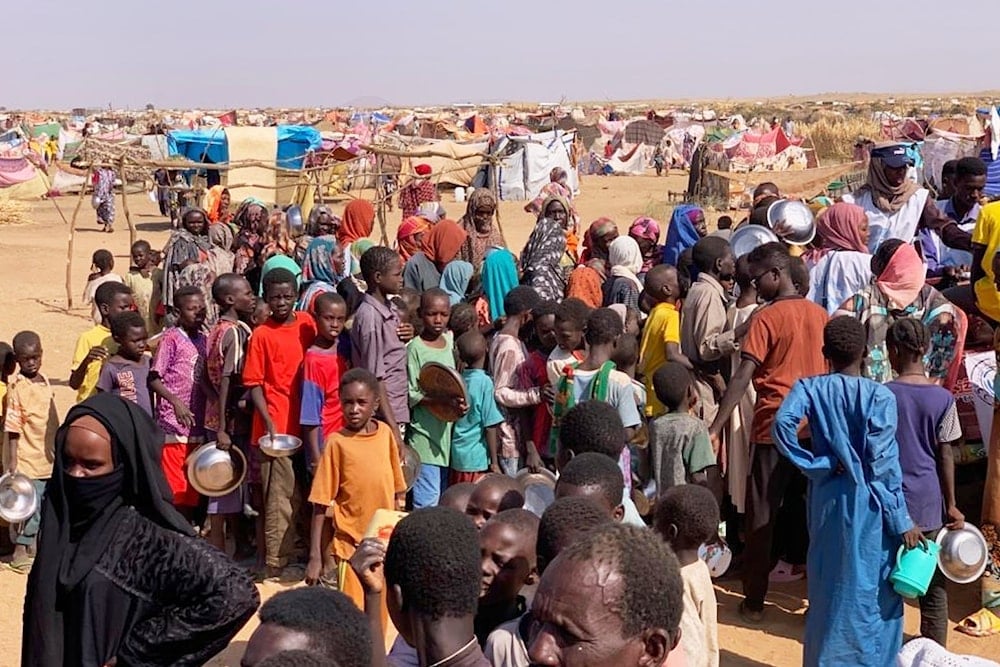Thousands flee Sudan’s El Fasher on foot without food or water: UNICEF
UN agencies report rising civilian casualties, mass displacement, and worsening humanitarian conditions in El Fasher following the RSF's takeover.
-

This photo, released by The Norwegian Refugee Council (NRC), shows displaced families from el-Fasher at a displacement camp where they sought refuge from fighting between government forces and the RSF, in Tawila, Darfur region, Sudan, Friday, Oct. 31, 2025 (NRC via AP)
Thousands of displaced families have walked more than 60 kilometers without food or water to escape the escalating violence in El Fasher, the capital of North Darfur, the UN Children’s Fund (UNICEF) said on Saturday.
“In Tawila, North Darfur, thousands of families are fleeing violence in El-Fasher, arriving exhausted, hungry & malnourished,” UNICEF said in a statement on the US social media platform X.
In #Tawila, North Darfur, thousands of families are fleeing violence in Al Fasher, arriving exhausted, hungry & malnourished.@UNICEF teams, like Abubakar, Nutrition Specialist, are on the ground providing lifesaving support to children and families who’ve lost everything. pic.twitter.com/JVHL079b1E
— UNICEF Sudan - اليونيسف في السودان (@UNICEFSudan) November 1, 2025
Abubakar Ahmed, a UNICEF nutrition specialist, said more than 6,000 people fled from El Fasher to Tawila last week alone, most of them women and children, and that displaced families continue to arrive daily.
Our colleague in Tawila spoke to people displaced from El Fasher.
— UN OCHA Sudan (@UNOCHA_Sudan) November 1, 2025
🔴Loss of family, no food, no water.
Conditions in Tawila are dire: safe water is limited, markets have collapsed, food, fuel and medical supplies are nearly depleted.
💙You can help: https://t.co/JzIBagDkvp pic.twitter.com/FVtv71ZajF
The displaced, he said, “came in a very bad, poor condition due to the long roads” between the two cities, which stretch over 60 kilometers. Many make the journey entirely on foot, often taking four or five days.
“The displaced face major challenges along the way, with some being beaten, while others spend days without food or water,” Ahmed said. “When they arrive, really, they looked thirsty, and most of them are malnourished, even children and adults.”
According to UNICEF, many children arrived alone, separated from their families, and unaware of their relatives’ whereabouts.
Reports from El Fasher reveal widespread atrocities by the Rapid Support Forces, including summary executions, ethnic killings, and attacks on hospitals. pic.twitter.com/J6gN5E5DOm
— Al Mayadeen English (@MayadeenEnglish) November 2, 2025
Patients die due to shortages
Meanwhile, the World Health Organization’s regional director urged the protection of health facilities and the guarantee of unhindered humanitarian access. Citing a doctor at El Fasher Hospital, the official said patients were dying due to shortages of medical supplies.
These photos were sent by civilians who fled El Fashir to Tawila. Tawila is overwhelmed & under-resourced. Survivors are malnourished and/or injured. We’re collecting donations to get them the help they desperately need.
— Displacement & Health Relief Network (@DHRNofficial) October 29, 2025
🔗: https://t.co/ODDGwXp45b pic.twitter.com/irGPIGVGYe
The mass displacement follows the RSF’s capture of El Fasher last Sunday after fierce clashes with the Sudanese army. There has been no immediate comment from the RSF regarding UNICEF’s statement.
Earlier on Saturday, Doctors Without Borders (MSF) said it was deeply concerned for thousands of civilians trapped inside El Fasher following the city’s fall to the RSF. The humanitarian group said its teams in Tawila were preparing to respond to a mass influx of displaced people and casualties.
UN experts warn of ethnic killings, atrocities in El Fasher
The UN Fact-Finding Mission on Sudan expressed grave alarm last week over escalating atrocities in El Fasher following its capture by the RSF, citing “direct and harrowing testimonies” from survivors detailing systematic attacks against civilians.
Despite limited access, the mission said early evidence points to “a deliberate pattern of ethnically targeted executions of unarmed civilians, assaults, sexual violence, widespread looting and destruction of vital infrastructure, and mass forced displacement.”
“As El Fasher burns and millions face starvation, the world must choose between silence or solidarity,” said Mohamed Chande Othman, chair of the Fact-Finding Mission.
“Since the siege of El Fasher and the surrounding camps, and following the RSF’s takeover of the city, the humanitarian crisis has deepened in real time. We must ensure that the cries of Sudan’s victims echo not into a void, but into action,” he stressed.
The mission said the fall of El-Fasher marks a devastating turning point in Sudan’s war, a city already crippled by eighteen months of siege, starvation, and relentless bombardment, now descending further into chaos.
Othman said the Human Rights Council’s recent renewal of the mission’s mandate for another year “is not just a procedural extension, it is a lifeline for accountability and a signal that the world is watching.”
Read more: RSF’s ‘Abu Lulu’ arrest branded a PR hoax amid El Fasher carnage

 4 Min Read
4 Min Read








